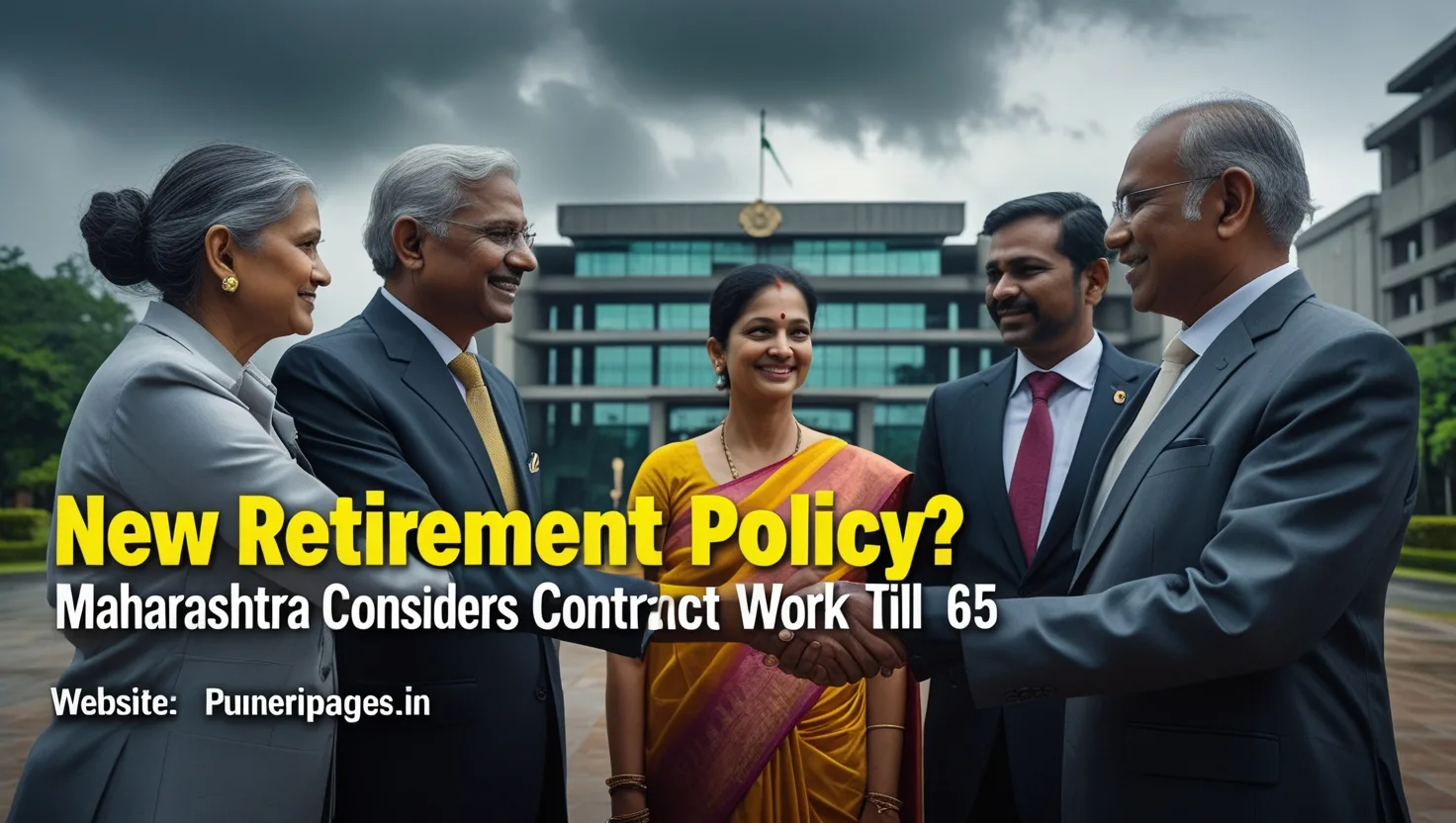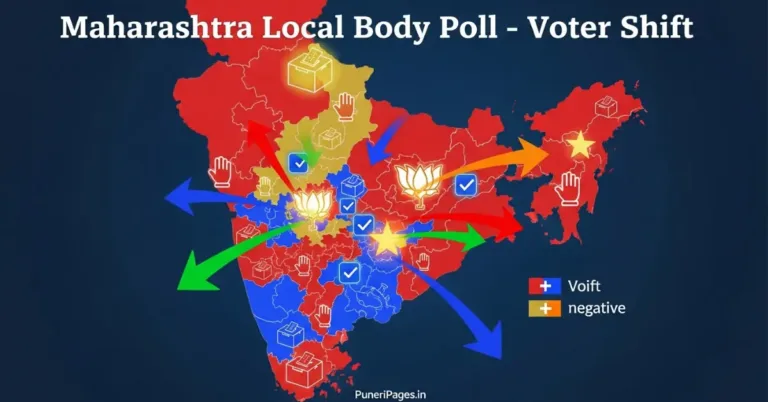
Symbolic image of Maharashtra’s proposed contract extension for retired employees, as featured on puneripages.in
Table of Contents
📰 Introduction
In a move that could significantly reshape post-retirement employment norms in Maharashtra, the state government is currently evaluating a new policy proposal that would permit retired government employees to work on a contract jobs until the age of 65. The push for such a policy is reportedly influenced by growing demands from various departments that continue to face staffing shortages despite repeated recruitment drives. Departments like Health and Education, in particular, have cited the need for experienced professionals who can be quickly deployed without extensive training. If implemented, this progressive initiative could bridge critical staffing gaps, make optimal use of institutional knowledge, and promote continuity in essential government services across departments. The move also aligns with broader administrative reforms intended to make governance more efficient and sustainable, and is reflective of a national trend toward leveraging senior expertise in public service.
🔍 Background and Context
At present, most government employees in Maharashtra retire between the ages of 58 and 60, depending on their position and department. However, many retirees still possess sharp skills, valuable experience, and a deep understanding of public administration. These assets often remain untapped once an employee retires, resulting in a brain drain for the state.
Recognizing this, the government is considering a structured framework that allows such retired individuals to return in a non-permanent capacity. Inspired by similar models already operational in states like Gujarat and Tamil Nadu, where retirees have been re-engaged in education, healthcare, and public administration, Maharashtra aims to replicate and tailor this approach to its own governance structure.
Furthermore, the move is seen as part of a broader attempt to modernize human resource policies within the government, especially at a time when attracting younger candidates into public service is becoming more competitive.
🗣️ Proposed Policy Highlights
- Eligibility: Government employees who have retired at the age of 58 or 60 from service
- Age Limit: Eligible for contractual work until the age of 65
- Contract Terms: Fixed-term contracts that are performance-based and renewable
- Scope: Emphasis on administrative, educational, technical, and advisory roles
- Selection Process: Transparent recruitment through recommendations and screening panels
- Remuneration & Benefits: Monthly pay on contract basis; pensions remain separate
- Performance Evaluation: Regular reviews based on clearly defined KPIs and feedback
✅ Benefits of the Policy
- Retention of Talent: Allows the system to benefit from experienced individuals who are already familiar with government workflows
- Reduced Training Time: Returning employees require minimal onboarding
- Faster Deployment: A solution to long recruitment cycles in departments with urgent staffing needs
- Mentorship and Guidance: Helps groom the next generation of civil servants
- Lower Costs: Contract-based engagements may reduce long-term financial commitments
- Continuity in Critical Projects: Especially relevant for departments managing long-term policies or schemes
⚠️ Challenges & Concerns
- Reduced Opportunities for New Entrants: Critics argue that it may shrink the space for fresh talent
- Transparency Issues: Fears about favoritism or opaque hiring practices must be addressed through strict oversight
- Union Opposition: Some government employee unions may resist the move as unfair or against retirement norms
- Contract Management: Monitoring performance and renewing contracts fairly will require robust administrative mechanisms
- Digital Literacy Gap: Some retirees may lack updated tech skills necessary for modern workflows
📌 Current Status and Timeline
The proposal is being actively reviewed by the General Administration Department (GAD). Discussions are ongoing with various stakeholders including department heads, HR officials, and labor unions. If consensus is achieved, the proposal will be presented to the Maharashtra Cabinet for final approval.
If cleared, the policy could be rolled out initially in a pilot phase across select departments like Health, Revenue, and Education, followed by wider implementation. The first phase could begin as early as the second half of the fiscal year 2025–26.
🌱 Long-Term Outlook
If successful, this policy could set a precedent for other states to rethink retirement and post-retirement roles in public service. It reflects a shift in how we perceive age and experience in the workplace—valuing wisdom and mentorship alongside youthful innovation.
It could also lay the foundation for more inclusive employment policies where retirees are viewed as assets rather than liabilities. For the citizens, it could mean faster file processing, better public interface, and improved service delivery through experienced hands.
🏁 Conclusion
The Maharashtra government’s potential policy to allow retired employees to serve until age 65 on a contractual basis presents a promising solution to balance experience with institutional needs. While it carries both opportunities and risks, with proper guidelines and implementation, it could be a game-changer in optimizing public sector performance.
To stay informed about this developing story and other major policy updates, bookmark puneripages.in.
❓ FAQs
1. When is this policy expected to be implemented?
It is still under review and may be launched in a pilot phase later in the current financial year.
2. Will retired employees receive both pension and contract salary?
Yes, but only the contract salary is new. Pension benefits remain unaffected and separate.
3. Which departments are likely to implement this first?
Health, Education, Revenue, and General Administration are expected to lead the rollout.
4. Will this policy reduce opportunities for new candidates?
Possibly, though it will be limited to critical roles where expertise is essential.
5. Can retired private sector professionals apply?
No, this policy is exclusively for retired Maharashtra government employees.
6. Will there be an entrance exam or just interviews?
A screening and recommendation process is likely, depending on the role.
7. Is this a full-time or part-time job?
That will depend on the department’s needs. Contracts could be full or part-time.
8. Will Class I and Class II officers be eligible?
Yes, the eligibility criteria include all cadres, but the final decision rests with departmental heads.
9. What is the maximum term for the contract?
Typically 1–2 years, renewable annually until the employee reaches age 65.
10. Where can I get more information or updates?
Visit puneripages.in or check official notifications from the General Administration Department.
11. Will this apply to those already re-employed on contracts?
They may be asked to reapply under the new policy once it is formalized.
12. Will there be provisions for training or upskilling?
Yes, training modules could be introduced to ensure retirees are familiar with updated tools and practices.






